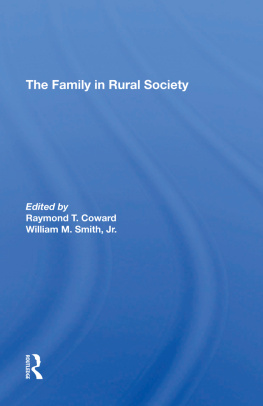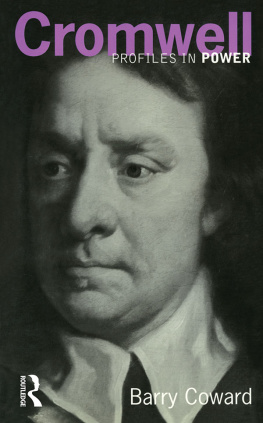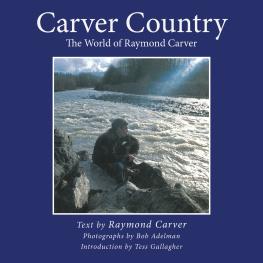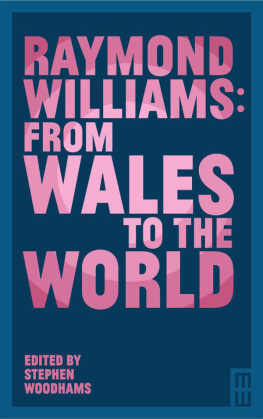The Family in Rural Society
Also of Interest
Rural Society ; Issues for the 1980s , edited by Don A. Dillman and Daryl S. Hobbs
Poverty in Rural America: A Case Study , Janet M. Fitchen
Rural Education in Urbanized Nations: Issues and Innovations, edited by Jonathan P. Sher
The Myth of the Family Farm: Agribusiness Dominance of U.S. Agriculture, Ingolf Vogeler
Women and the Social Costs of Economic Development: Two Colorado Case Studies , Elizabeth Moen, Elise Boulding, Jane Lillydahl, and Risa Palm
Education in Rural America: A Reassessment of Conventional Wisdom, edited by Jonathan P. Sher
The Family in Post-Industrial America: Some Fundamental Perceptions for Public Policy Development , edited by David Pearce Snyder
Violence and the Family, edited by Maurice R. Green
Making of Child and Family Policy, edited by Harold C. Wallach and Lyn Chambers
Politics in Rural America: People, Parties, and Policy, Frank M. Bryan
Available in hardcover and paperback.
Westview Special Studies in Contemporary Social Issues
The Family in Rural Society
edited by Raymond T. Coward and William M, Smith, Jr.
Social and political attention often is focused on urban issues, neglecting the still-rural character of much of the United States. This volume of original papers provides a clear picture of present-day rural society, with special emphasis on the changing role and structure of the family. It describes demographic trends, discusses the family aspects of the new wave of inmigrants to small towns and rural communities, reviews the diversity of patterns and forms adopted by rural families, considers the plight of the rural aged, and explores the dynamics of intrafamily personal relationships. The book ends with speculations on future prospects and challenges facing rural families.
Dr. Raymond T. Coward is research associate professor at the Center for Rural Studies and associate professor in the College of Education and Social Services at the University of Vermont. Dr. William M. Smith, Jr., is professor emeritus of rural sociology at the Pennsylvania State University. Both Dr. Coward and Dr. Smith are active members of the Rural Sociological Society.
The Family in Rural Society
edited by Raymond T. Coward and William M. Smith, Jr.
First published 1981 by Westview Press
Published 2019 by Routledge
52 Vanderbilt Avenue, New York, NY 10017
2 Park Square, Milton Park, Abingdon, Oxon OX14 4RN
Routledge is an imprint of the Taylor & Francis Group, an informa business
Copyright 1981 by Taylor & Francis
All rights reserved. No part of this book may be reprinted or reproduced or utilised in any form or by any electronic, mechanical, or other means, now known or hereafter invented, including photocopying and recording, or in any information storage or retrieval system, without permission in writing from the publishers.
Notice:
Product or corporate names may be trademarks or registered trademarks, and are used only for identification and explanation without intent to infringe.
Library of Congress Cataloging in Publication Data
Main entry under title:
The Family in rural society.
(Westview special studies in contemporary social issues)
Includes index.
1. Rural familiesUnited StatesAddresses, essays, lectures. I. Coward, Raymond T.
II. Smith, William M. III. Series: Westview special studies in contemporary social issues.
HQ536.F369 306.8'0973 81-1769
ISBN 0-86531-121-8 AACR2
ISBN 13: 978-0-367-29207-2 (hbk)
TO THE FAMILIES OF RURAL AMERICA,
THEIR INNER STRENGTHS AND
THEIR CONTINUING RESOURCEFULNESS
Contents
- Part 1
Current Trends in the Family in Rural Society - Part 2
Patterns and Forms of Rural Families - Part 3
Family Dynamics - Part 4
Prospects and Perspectives on Rural Families
- Part 1
Current Trends in the Family in Rural Society - Part 2
Patterns and Forms of Rural Families - Part 3
Family Dynamics - Part 4
Prospects and Perspectives on Rural Families
Guide
The impetus for this volume emerged in 1975 from the Family Research Interest Group of the Rural Sociological Society. At their annual meeting, the family group agreed that there was a critical and growing need for a comprehensive volume focused exclusively on the family in rural society. Since no such volume existed, the group believed that such a collection could make a significant contribution to the better understanding and appreciation of rural family life among practitioners, researchers, and policymakers. Although the final form of this volume is considerably reduced in scale and scope from the original idea, it nevertheless is the initial tangible result of that collective effort. To acknowledge this origin, the authors and editors have assigned all royalties accrued from this volume to the Rural Sociological Society. It is the desire of the authors and editors that these monies be used to stimulate and facilitate continued debate and attention to the critical issues that are faced by families in rural society.
In preparing this volume, we created an outline covering what we felt were some of the most critical issues concerning families in rural society and invited selected individuals to prepare contributions. The advantage of this approach is that the authors are leaders in their respective fields of inquiry. The result, we believe, is that the individual contributions are more thoroughly documented and up-to-date than is possible when one or two authors attempt to review the pertinent literature on a wide range of topics. This does, however, mean that there is no single overarching conceptual framework imposed on the collection. Not all contributors agree with each other, nor do the editors agree with all contributors. We hope that this display of differences will only highlight the issues and serve as a useful contrast to the generally agreed-on main principles.
The creation of a collection of readings is a considerable undertaking and requires the collective support and commitment of many individuals. It would be impossible to list all those who have contributed their time and effort to the conceptualization, reformulation, preparation, and review of the chapters included in this volume. However, certain key individuals do need to be recognized.
First, and foremost, are the authors, who unselfishly devoted their time to this project. They were not paid for their individual contributions; rather, they felt the professional obligation and responsibility to share their experience, knowledge, and expertise. They represent, in our minds, some of the finest individuals with whom we have had the pleasure of working. Without their patience, tenacity, and professionalism this volume would not have become a reality.
In addition, the support and encouragement of colleagues is critical when projects are being formed, frameworks constructed, and advice sought. Many colleagues have contributed directly and indirectly to the making of this volume, but some deserve special mention and thanks: Charles R. Figley, Donald W. Felker, Russell A. Mullens, Robert W. Jackson, Richard K. Kerckhoff, Frederick E. Schmidt, F. Ivan Nye, Glenn R. Hawkes, Victor A. Christopherson, Katheryn A. Dietrich, and Jeanne Nolan.








